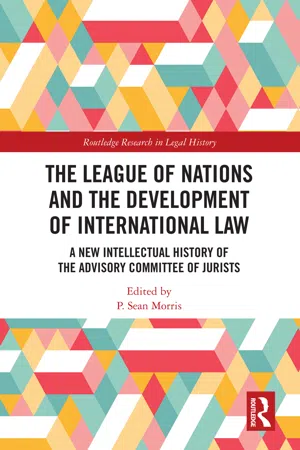
The League of Nations and the Development of International Law
A New Intellectual History of the Advisory Committee of Jurists
- 280 pages
- English
- ePUB (mobile friendly)
- Available on iOS & Android
The League of Nations and the Development of International Law
A New Intellectual History of the Advisory Committee of Jurists
About this book
This volume examines the contributions to International Law of individual members of the Advisory Committee of Jurists in the League of Nations, and the broader national and discursive legal traditions of which they were representative. It adopts a biographical approach that complements existing legal narratives.
Pre-1914 visions of a liberal international order influenced the post-1919 world based on the rule of law in civilised nations. This volume focuses on leading legal personalities of this era. It discusses the scholarly work of the ACJ wise men, their biographical notes, and narrates their contribution as legal scholars and founding fathers of the sources of international law that culminated in their drafting of the statute of the Permanent Court of International Justice, the forerunner of the International Court of Justice. The book examines visions of world law in a liberal international order through social theory and constructivism, historical examination of key developments that influenced their career and their scholarly writings and international law as a science.
The book will be a valuable reference for those working in the areas of International Law, Legal History, Political History and International Relations.
Frequently asked questions
- Essential is ideal for learners and professionals who enjoy exploring a wide range of subjects. Access the Essential Library with 800,000+ trusted titles and best-sellers across business, personal growth, and the humanities. Includes unlimited reading time and Standard Read Aloud voice.
- Complete: Perfect for advanced learners and researchers needing full, unrestricted access. Unlock 1.4M+ books across hundreds of subjects, including academic and specialized titles. The Complete Plan also includes advanced features like Premium Read Aloud and Research Assistant.
Please note we cannot support devices running on iOS 13 and Android 7 or earlier. Learn more about using the app.
Information
1
The legal conscience of a universal man
Rafael Altamira y Crevea (1866–1951)
1. Introduction
Table of contents
- Cover
- Half Title
- Series Page
- Title Page
- Copyright Page
- Contents
- List of contributors
- Acknowledgements
- Introduction: the ‘wise men’ of the Advisory Committee of Jurists (ACJ) and contemporary legal biography
- 1 The legal conscience of a universal man: Rafael Altamira y Crevea (1866–1951)
- 2 National political ideologies and international legal practices: Raul Fernandes (1877–1968)
- 3 A civilizational pluralist and inegalitarian: Mineichiro Adachi (1869–1934)
- 4 George Francis Hagerup (1853–1921): a Norwegian legal internationalist
- 5 Elihu Root (1845–1937): architect and advocate of the Permanent Court of International Justice
- 6 Forgetting Albert Geouffre de Lapradelle (1871–1955) and ignorance as remembering
- 7 Edouard Descamps (1847–1933): from ‘negative neutrality’ to ‘positive pacigerate’
- 8 The judicial-churchman for peace: Walter George Frank Phillimore (1845–1929)
- 9 ‘Where is your tribunal?’ Bernard Loder (1849–1935) and the quest for international justice
- 10 The Italian jurist and diplomat at the Advisory Committee of Jurists: Arturo Ricci Busatti (1868–1923)
- Index